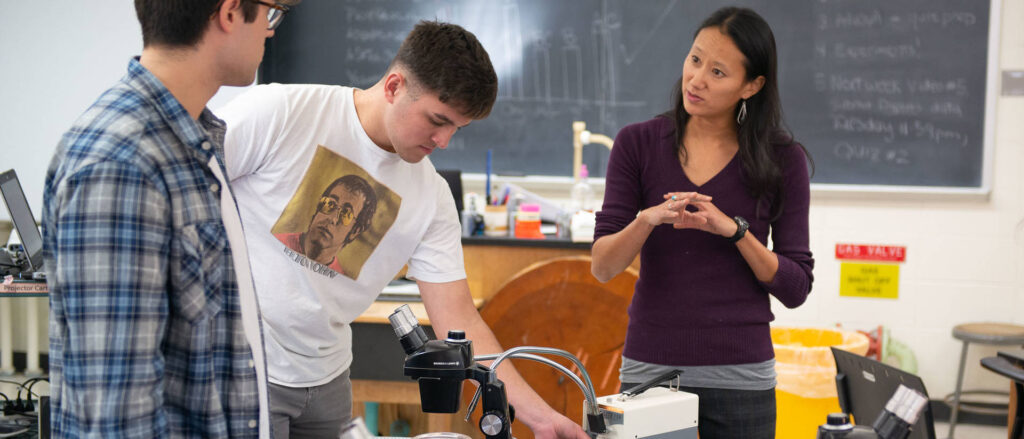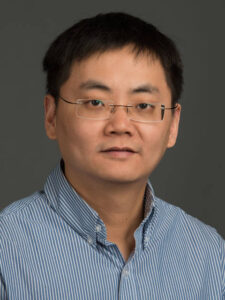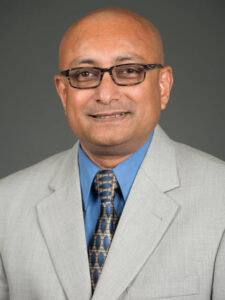
Dr. Nora Mitchell, UW-Eau Claire assistant professor of biology, will direct a workshop for Upward Bound students on using the supercomputing cluster to build evolutionary trees to understand relationships among species. Mitchell is shown in this photo working with UW-Eau Claire students. (Photo by Shane Opatz)
Some Eau Claire high school students will get firsthand experiences this week in the first summer workshops for high-performance computing, all taught by University of Wisconsin-Eau Claire faculty and staff volunteers.
Eight faculty members are collaborating with UW-Eau Claire’s Upward Bound program, which provides postsecondary educational opportunities for disadvantaged North and Memorial High School students, on the supercomputing workshops. Members of the university’s Learning and Technology Services staff also will work with students.
High-performance computing allows for the processing of large amounts of data and performing complex calculations at high speeds.

Dr. Ying Ma, associate professor in materials science and biomedical engineering
About 50 high school students will participate in 10 sessions on Friday, June 25, and July 9 in UW-Eau Claire’s Hibbard Hall computer labs. The workshops range from biology and computer science to chemistry and materials science and biomedical engineering.
“We firmly believe that computational skills will benefit students and we will try our best to build those skills and to bring computational sciences to a wide audience,” says Dr. Ying Ma, associate professor in materials science and biomedical engineering. “With this workshop, we hope to bring HPC and computational sciences to local high school students, potentially attracting bright minds, especially those from underrepresented groups, to our campus where they can enjoy a unique education in HPC.”
Ma and Dr. Sudeep Bhattacharyay, associate professor of chemistry and biochemistry, wrote a National Science Foundation proposal in 2018 and received a $350,000 grant to help purchase a high-performance supercomputing cluster for UW-Eau Claire. The UW-Eau Claire Foundation secured an in-kind grant of more than $360,000 in hardware from Hewlett Packard Enterprise and UW-Eau Claire also contributed $20,000 toward the Blugold Center for High-Performance Computing.
Outreach to local communities and schools was a priority in the NSF grant application.
“We believe that HPC is becoming an increasingly important tool in virtually all disciplines of science and engineering,” Ma says. “It also drives innovations in various industries, including advanced materials, manufacturing, medicine and biomedical engineering, to name a few. Educating a workforce with advanced computational skills becomes a critically important task for higher education.”
UW-Eau Claire’s Upward Bound director Kimamo Wahome stressed how important meaningful, high-impact experiential opportunities are to Upward Bound’s pre-college students. A large majority of Upward Bound students are in the demographics that are most underrepresented in STEM fields — the economically disadvantaged, multicultural and female students, Wahome says.
“Signing onto this opportunity was a no-brainer,” Wahome says. “Quite a few of the students enrolled in our Upward Bound program are, and will be, enrolled in enrichment and advanced placement courses in mathematics, physical science and technology in high school, and maintain long-term vocational interest pursuing college majors in a STEM field.”
Bhattacharyay and Ma credit UW-Eau Claire faculty and staff across multiple disciplines for volunteering their time for the workshops.
“Staff and faculty members are passionate about the science, the high-performance computing environment and the teaching aspects of the workshop,” Bhattacharyay says. “They agreed to contribute voluntarily. This speaks volumes about the work culture of the university where hard-working and creative individuals work tirelessly for their students to build up future national leaders.”
Bhattacharyay will instruct a workshop titled “Making the Atoms Dance.”

Dr. Sudeep Bhattacharyay, associate professor of chemistry and biochemistry
“We do not have microscopes to view atoms, but quantum chemistry-based high-performance computations offer us a unique opportunity to see these constantly moving atoms,” Bhattacharyay says. “Hidden from our eyes, these computations exhibit constant oscillatory motions appearing like a group of dancing atoms.”
Dr. Nora Mitchell, assistant professor of biology, will direct a workshop on using the supercomputing cluster to build evolutionary trees to understand relationships among species. The workshop will focus on a group of South African shrubs Mitchell has previously researched and will use the supercomputer to analyze a large amount of sequence data.
Mitchell volunteered for the workshop because she sees it as a great way to show high school students the power of computing in ways they may not have imagined.
“These workshops may open the door to future studies as students think about college,” Mitchell says. “I hope we can demonstrate that computing is not scary and that it can actually be fun.”
Organizers said they would like to see the workshop become an annual event.
